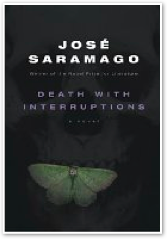
Originally published in The Blade on Sunday, December 28, 2008
BY RYAN E. SMITH
BLADE STAFF WRITER
Nobel Prize-winning novelist Jose Saramago has a special gift for you this New Year's Eve: The clock strikes midnight, everyone drinks their champagne, and ... no one dies.
Nobody dies the next day either. Or the next. It's humanity's greatest dream, right? Or nightmare. In the hands of the deft author of the slim novel Death with Interruptions, it's a bit of both.
Saramago is a man who loves to consider fantastical what-if situations and then run with them. His wonderful book Blindness — recently adapted into a box office dud starring Julianne Moore — calculated the horribly dark consequences of human nature when a "white blindness" spreads across a population like lightning.
In this case, death (with a lower case 'd,' she insists) puts away her emblematic scythe for a while to teach humanity a lesson, and it has nothing to do with why Brad Pitt played her in Meet Joe Black. Instead, Saramago, a fable writer with an easy touch, takes the Death Takes a Holiday theme and plays with it in different and interesting ways.
He considers all the possible implications. At first there is instant rejoicing from the people. But at hospitals, the halls begin to overflow with terminally ill patients who just won't die. Funeral directors face ruin as they're left with nothing to bury but pet parakeets. Clergy are left in the strange position of praying for death, for without it there can be no resurrection.
The absence of death changes the calculus of determining the value of life, and in time everyone, from regular families to government rulers, begins to realize just what everlasting life will mean for a society in practical terms if there is no everlasting youth to go with it. As one character observes, "If we don't start dying again, we have no future."
Then death re-enters the picture — with a twist — and things get interesting all over again.
The plot in Death with Interruptions is merely a vehicle for Saramago to explore a metaphor, to riff on some of his favorite societal conventions and shuffle some ideas into your head when you're not looking. It's an essay, really, that is made entertaining by the sheer power of his writing and wit.
The Portuguese author brings his trademark style to the book, all run-on sentences and paragraphs that span several pages and exercise the use of periods and capital letters when they feel like it. Unnerving at first, it fits his conversational style of storytelling as one anecdote bleeds comfortably into the next, as one aside by the narrator leads to another and yet another.
Saramago has the rare ability to go from straight-up funny (often in an understated, matter-of-fact kind of way) to philosophical in a heartbeat, and the story, with its nameless characters in a nameless country, carries you along even when you're not sure where it's going.
That's sort of the point, to see the organic flow that life is all about, and that death just doesn't understand. Until maybe, one day, something that not even death expects happens and she decides to leave her bare room with her trusty, silent scythe and check it out for herself.

DEATH WITH INTERRUPTIONS.
By Jose Saramago. Houghton Mifflin Harcourt. 256 pages. $24.